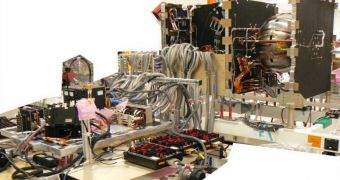The European Space Agency (ESA) has a very ambitious project in store for the future, which is the construction of the Galileo satellite navigation network. This will basically be the European equivalent to the United States-built Global Positioning System (GPS), which covers the entire globe. But there is still a lot of work to be done before Galileo becomes operational, and recently an important milestone was achieved. The four platforms for the Galileo In-Orbit Verification (IOV) satellites have been reunited for the first time under the same roof.
The IOV stage of Galileo is of the utmost importance for the success of the entire network. The four satellites that will make up this early array will have a design and functionality that will be very similar to those of the first Full Operational Capability (FOC) Galileo spacecrafts, and will be used to test a variety of parameters before actual launches begin. At this point, the first pair of IOV satellites is scheduled to be launched around April 2011, but no firm date has yet been established. The definition, and development stages of Galileo, as well as its IOV phase, is being funded jointly by ESA and the European Community.
“While the engineering model is undergoing testing, all four platforms for the Galileo In-Orbit Verification satellites have now arrived in the integration clean room at Thales Alenia Space in Rome. The first platform, for the proto-flight satellite, is fully assembled and is undergoing its final functional tests. Upon delivery of the payload, the two elements will be mated before undergoing a series of environmental tests,” ESA officials write in a press release.
“Flight Model 2 is completing its avionics function tests and being prepared for integration of the power subsystems. The avionics units are being mechanically and electrically integrated on FM3. The platform is now ready for the functional test. FM4 arrived in Rome in March and is having its harness installed and instrumentation integrated,” they add. The first IOV launch is scheduled to take place from the ESA-operated Kourou Spaceport, in French Guyana. The two spacecrafts will be delivered to orbit aboard a Russian-built Soyuz rocket.

 14 DAY TRIAL //
14 DAY TRIAL //